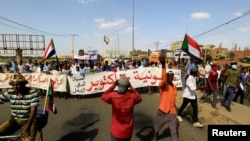Sudan’s military leader, General Abdel Fattah al-Burhan, has appointed new members of a Transitional Council he leads.
Burhan's move contradicts repeated promises from the military that they will hand over power to civilian authorities after seizing it in an October 25 coup which drew international condemnation. The United Nations said the development is “very concerning.”
This comes as members of the Forces for Freedom and Change are planning yet another protest this Saturday.
VOA's James Butty spoke with journalist Michael Ati in Khartoum, who says the new Transitional Council includes three members of the armed groups that joined the old council following the Juba Peace Agreement.
This interview has been edited for clarity and brevity.
VOA: Who are the members of the newly appointed Transitional Council?
Atit: The newly appointed Transitional Council is headed by General Abdel-Fattah Burhan, with Sudan's paramilitary leader Mohammed Hamdan Dagalo in secondary command. The three other military members are Shams El-Din Kabashi, Yasser Abdel-Rahman Hassan Al-Atta, and Ibrahim Jaber. These five members were initially in the previous council as well.
VOA: Who are the civilian members of this new council?
Atit: They are Malik Agar, the leader of the Sudan People's Liberation Movement, Al-Taher Hajar, and Al-Hadi Idris. These are three members of the Sudanese Revolutionary Front, which signed the Juba Peace Agreement, who have been reappointed in the council. There is a neutral female member, Raja Nicola Abdel-Masih. The new faces on board are Youssef Gad Karim, Abu Al -Qasim Mohamed, Abdul Al-Baqi Abdul-Qader and another female, Salma Abdul-Jabbar.
VOA: What has been the Forces for Freedom and Change's reaction to thisd new council?
Atit: While the Forces of Freedom and Change have not issued a formal statement, these developments are not seen by them as good news. A statement of condemnation may soon be issued by them because they are not part of this new leadership council. While there has been speculation of Hamdok being appointed to the council, it appears that they might have reached a roadblock of appointing. So, it's still unknown.
VOA: A court had ruled that the Internet should be restored. Has that happened?
Atit: Up to this moment, the Internet has not turned back on. This might be the military's precaution in the face of the mass protest planned across Sudan Saturday. So the Internet may not be restored until this protest is done.
